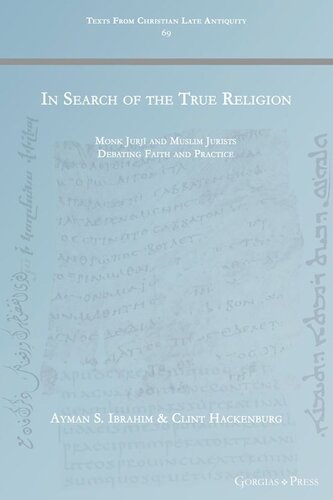

Most ebook files are in PDF format, so you can easily read them using various software such as Foxit Reader or directly on the Google Chrome browser.
Some ebook files are released by publishers in other formats such as .awz, .mobi, .epub, .fb2, etc. You may need to install specific software to read these formats on mobile/PC, such as Calibre.
Please read the tutorial at this link: https://ebookbell.com/faq
We offer FREE conversion to the popular formats you request; however, this may take some time. Therefore, right after payment, please email us, and we will try to provide the service as quickly as possible.
For some exceptional file formats or broken links (if any), please refrain from opening any disputes. Instead, email us first, and we will try to assist within a maximum of 6 hours.
EbookBell Team

4.0
6 reviewsIn the thirteenth-century, a debate transpired over the course of several days between a monk named Jurjī and several Muslims jurists in the city of Aleppo. This debate represents a careful and sophisticated example of a literary genre that Sidney Griffith calls the “monk in the emir’s majlis.” By the time of Jurjī’s debate, this literary genre had been developing among the Christians living under Islamic rule since the seventh century. Prominent examples of this genre were composed by Timothy I, Theodore Abū Qurrah, and Elias of Nisibis to name a few. During his encounter, Jurjī and his opponents discuss the entire gamut of Christian-Muslim controversy, from dietary restriction and sexual relations to the Trinity and Incarnation. Jurjī’s can be divided into three major sections: (1) Comparing the Messages and Personalities of Christ and Muḥammad; (2) The Sacraments of Christianity; and (3) An Examination of the Four Major Religions. In addition to citing scriptures in his arguments, both the Bible and the Qurʾān, Jurjī uniquely makes use of extended parables throughout his debate. Although the general tenor of the debate is friendly and respectful, Jurjī does occasionally offer rather frank criticisms of both Islam and Muḥammad. Nevertheless, in the end after triumphantly defending Christianity and systematically criticizing Islam, Jurjī is praised by the emir and marches off into the sunset toward his monastery. The immense popularity of this work is demonstrated by the sheer volume of surviving manuscripts, which number around hundred. Due to the lack of academic study of this notable work, we have decided to prepare a critical edition and translation of a once significant work among the Christians of the Middle East with the hopes of reviving its importance in the monk in the emir’s majlis genre.